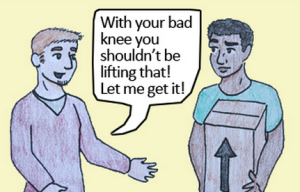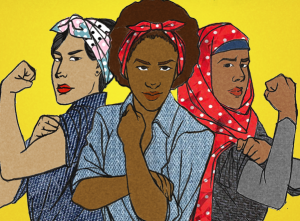(Content Warning: rape)
If you don’t yet know who Chrissy Chambers is, you soon will.
Chambers, an American LGBTQIA+ activist and YouTube star, is making history as the first person in the United Kingdom to bring both civil and criminal charges against a former partner for posting revenge porn.
Chambers’ story is horrifying, but not unfamiliar: After Chambers suggested to her then-boyfriend that they take a break from their relationship, he suggested they meet up for drinks. After Chambers became extremely intoxicated, her ex proceeded to sexually assault her and film it, all while she was nearly unconscious and without her consent.
Chambers says she has no memory of this night, let alone of any filming taking place.
After she broke things off, he posted the footage – where it eventually spread to 35 different porn websites – including her full name and face, but blurring out his own face.
Chambers’ reported her ex to the Atlanta police for rape, but, unsurprisingly, they decided not to press charges (as we know, it’s exceedingly difficult to get justice for victims of rape).
That’s when Chambers made the brave decision to seek out justice in the UK. Because her ex had posted the videos while in Britain, she could still bring charges against him as they related to the revenge pornography.
So Why Should We Care?
As Chambers waits to hear if charges will be brought – she was interviewed by police last April – she is now using her voice and her platform on YouTube to call for an end to revenge porn, including petitioning the United States Congress to pass a bill that would criminalize revenge porn in the United States.
Everyone, feminists included, should take note of Chambers’ story, and moreover, should join her and countless victims as they take a stand against revenge porn.
Why?
In short, because the posting of explicit content without someone’s consent is part of a larger systemic issue – that is, misogyny, sexual assault, and rape culture.
I want to unpack some of these ideas, though.
Let’s break it down point-by-point.
1. While Anyone Can Be a Victim of Revenge Porn, Women Are Disproportionately the Victims
We’ve seen instances of revenge porn surfacing time and time again, and the stories start to blur together after a while. She breaks things off, he becomes enraged, and the next thing she knows, a friend is e-mailing because her name is plastered all over pornographic websites.
Why do we keep hearing the same stories of victimization over and over again?
Some studies have shown that upwards of 90% of victims of revenge porn are women. And while it’s absolutely essential that any victim, regardless of gender, can get justice, the gender breakdown of this phenomenon points to something more sinister at play.
The viewing of women’s bodies as objects and commodities, as well as the tendency to shame women for their sexuality, largely plays into the targeting of women through cyber sex crimes like revenge porn.
We already have a tendency to view women’s bodies as public property rather than belonging to themselves. It’s not surprising, then, that revenge porn targets women in particular.
Depriving women of ownership over their bodies is the whole premise of revenge porn – it’s literally taking away her control and giving access to her body to thousands, even millions, of people.
Revenge porn, then, seems like a natural extension of a culture that already wants to control and exploit women’s bodies and sexualities for its own gain.
The ways that misogyny plays into this epidemic of revenge porn should be of serious interest to feminists. Revenge porn and other cyber sex crimes are just the newest manifestation of misogyny.
2. Revenge Porn Is a Form of Sexual Violence
Revenge porn is, by its very definition, non-consensual. Posting explicit content without someone’s permission, even if they agreed to taking the photos or video, is a form of abuse.
We, as sexual beings, should have complete control over our bodies and our sexualities. Violating our bodily autonomy, and allowing our bodies to be subject to humiliation and unwanted sexual exploitation, is undoubtedly a form of violence.
In fact, revenge porn has also been referred to as “cyber rape,” among other descriptors, because of its exploitative nature. In many ways, it’s repeated victimization each time our bodies are, against our will, subjected to someone else’s gaze, commentary, threats, and abuse.
When we talk about preventing sexual assault, revenge porn and other cyber sex crimes must be part of that dialogue. The sad reality is that, in a day and age in which the Internet rules, these crimes will only increase in number.
3. It’s an Undeniable Product of Rape Culture
Rape culture, simply put, is a culture that normalizes sexualized violence and blames the victims of sexual assault, particularly women.
The way that revenge porn is seen as inevitable, for example, is part of a culture that normalizes this kind of abuse and dismisses its problematic nature.
Countless people have said that if you willingly allow yourself to be filmed or photographed in a sexual context, you should “just expect” that the content will end up online – as if consenting to a private activity with a partner means that you’ve consented to being publicly humiliated. How could these possibly be the same thing?
Even in the case of non-consensual filming, as with Chrissy Chambers, people have blamed the victims for drinking, or hanging out with the wrong crowd, or dressing provocatively – or being sexual at all.
People will find any opportunity to disparage the victim’s reputation and find a way to pin the abuse on the abused rather than the abuser. This is rape culture, and revenge porn is just another manifestation of it.
The reality is that we have every right to engage in consensual sex acts, even those that include filming and photographing, and that engaging in those acts doesn’t mean we deserve to be abused, humiliated, and degraded.
Our bodies and our sexualities belong to us, and consenting to be photographed or filmed is not consenting to having that content viewed by others, and especially not to be used to manipulate or abuse us.
But in this culture, we have normalized revenge porn as a natural consequence of the Internet instead of a sex crime that can (and does) ruin lives.
Rape culture means that a sex crime committed by an abuser is instead viewed as a hazard of the Internet that victims “should’ve seen coming.”
4. The Impact on Victims Is Devastating and Dangerous
When Chrissy Chambers shared her story, it became clear that revenge porn is about more than just protecting someone’s reputation.
Chambers developed post-traumatic stress disorder (PTSD), which resulted in night terrors and deep depression; she turned to alcohol to cope, which escalated to a near-death incident in which she was hospitalized for overconsumption of alcohol.
The trauma that came with such public abuse nearly killed Chambers and shook those who loved her to the very core. She sought out mental health services, which, according to stats, nearly half of revenge porn victims eventually do.
That alone is reason for concern, but it gets worse.
The sensitive information that accompanies the revenge porn (which often includes a full name, e-mail address, social media profiles, and even home addresses, phone numbers, or social security numbers) can endanger the lives and physical safety of victims, subjecting them to further abuse.
Many victims report losing their jobs, losing their partners, being subject to online and even offline harassment, being stalked by users who saw the pornographic material, and facing threats and intimidation. The posting of revenge porn is often only the beginning of incredible abuse.
They live in constant fear of the material being discovered by friends, family, children, partners, employers, and co-workers. According to one study, 93% of victims have said that they suffered significant emotional distress, and 82% said that impairment impacted their social and occupational functioning.
As a result of this abuse, half of all victims of revenge porn contemplate suicide.
Which makes what I’m about to tell you even more shocking.
5. People Are Exploiting Victims to Make More Money
Victims are already in a vulnerable position, and yet many of the websites that host revenge porn forums and websites will charge money before they consider removing the content.
As Danica Johnson discussed in a previous Everyday Feminism article, websites like MyEx.com, which actively encourage the publishing of revenge porn, will ask victims to pay $500 dollars to have the content taken down from the website. This does not guarantee, however, that the content hasn’t spread.
The amount of money being extorted from victims of these sex crimes is truly staggering.
The idea that victims are paying – both emotionally and financially – for a crime that someone else committed just goes to show how little accountability there really is.
A system this warped requires real advocacy on our parts – not just to protect victims from the abuse, but to ensure they won’t be subject to further exploitation and extortion.
So why aren’t victims coming forward and pressing charges?
Well, that’s because…
6. There Are Seldom (If Ever) Any Legal Ramifications for Posting Revenge Porn
In the United States, there are a small number of states that have made revenge porn illegal in some capacity. But not only is it difficult to prove and even more difficult to enforce, it’s nearly impossible to get the content removed, as the laws that do exist criminalize the abuser, but not the platform that they uploaded the content to.
Simply put, the few existing laws do very little to help victims.
In the UK, where Chambers is pressing charges, a new law was recently introduced in England and Wales, which may provide hope for new victims – not Chambers, however, whose videos were uploaded years ago. Instead, she must rely on older legislation to make her case.
As The Guardian reported, civil claims are even trickier.
Victims of revenge porn cannot sue for defamation, despite the enormous damage that is done. The films or photographs in question capture events that really happened, and therefore cannot be viewed as “false statements.”
Pardon my language, but that is fucked up.
There are also holes in much of the existing legislation.
In the UK, for example, the recently passed laws around revenge porn require that you prove there was malicious intent. This is not only subjective and difficult to prove, but it also excludes those who post revenge porn for their own amusement or for financial gain.
As we find with any kind of sexual assault, justice is still more often a dream than a reality. For victims, they are, more often than not, left helpless.
This is why cases like Chambers’ are so important for feminists to be engaged with. We need to continue to advocate for all victims so that we can improve the laws, protect victims, and prevent these crimes in the future.
***
Simply put: Revenge porn is part of a larger system and culture that normalizes sex crimes, blames victims, and enables abusers. Worse yet, in nearly every instance of revenge porn, the abuser is never brought to justice, let alone charged with a crime.
When Chrissy Chambers’ ex posted those videos for the world to see, “Life as I had known it ended,” she said. “How can there be no consequences for the perpetrators who commit such horrific acts?”
People – and especially feminists – everywhere should be asking the same question.
If we believe in the bodily autonomy of every human being and ending all forms of sexual violence, we should care about revenge pornography – and the systems, platforms, and culture that allows it to thrive.
If you are the victim of revenge porn and need guidance, check out this guide at Everyday Feminism.
[do_widget id=”text-101″]
Sam Dylan Finch a Contributing Writer for Everyday Feminism. He is queer writer, activist, and educator based in the San Francisco Bay Area. In addition to his work at Everyday Feminism, he is also the founder of Let’s Queer Things Up!, his hella queer and very awesome blog. You can learn more about him here and read his articles here. Follow him on Twitter @samdylanfinch.
Search our 3000+ articles!
Read our articles about:
Our online racial justice training
Used by hundreds of universities, non-profits, and businesses.
Click to learn more





















